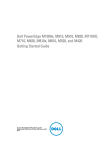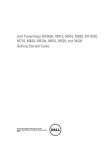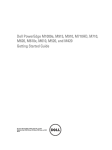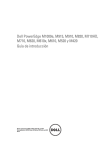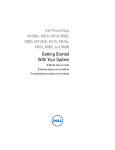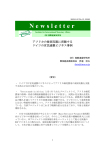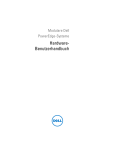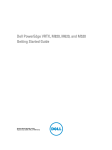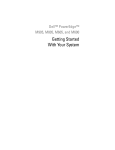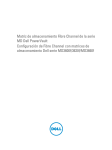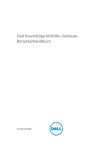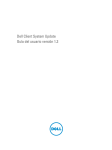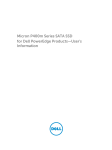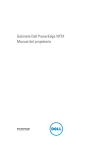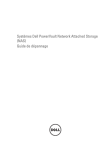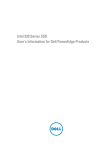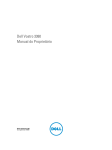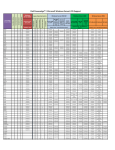Download Dell PowerEdge M910 Setup Guide
Transcript
Dell PowerEdge M1000e, M915, M910, M820, M710HD, M710, M620, M610x, M610, M520, and M420 Getting Started Guide Regulatory Model: BMX01, DWHH, HHB, FHB, and QHB Regulatory Type: DWHH Series, HHB Series, FHB Series, and QHB Series Notes, Cautions, and Warnings NOTE: A NOTE indicates important information that helps you make better use of your computer. CAUTION: A CAUTION indicates either potential damage to hardware or loss of data and tells you how to avoid the problem. WARNING: A WARNING indicates a potential for property damage, personal injury, or death. © 2013 Dell Inc. All Rights Reserved. Trademarks used in this text: Dell™, the Dell logo, Dell Boomi™, Dell Precision™ , OptiPlex™, Latitude™, PowerEdge™, PowerVault™, PowerConnect™, OpenManage™, EqualLogic™, Compellent™, KACE™, FlexAddress™, Force10™, Venue™ and Vostro™ are trademarks of Dell Inc. Intel®, Pentium®, Xeon®, Core® and Celeron® are registered trademarks of Intel Corporation in the U.S. and other countries. AMD® is a registered trademark and AMD Opteron™, AMD Phenom™ and AMD Sempron™ are trademarks of Advanced Micro Devices, Inc. Microsoft®, Windows®, Windows Server®, Internet Explorer®, MS-DOS®, Windows Vista® and Active Directory® are either trademarks or registered trademarks of Microsoft Corporation in the United States and/or other countries. Red Hat® and Red Hat® Enterprise Linux® are registered trademarks of Red Hat, Inc. in the United States and/or other countries. Novell® and SUSE® are registered trademarks of Novell Inc. in the United States and other countries. Oracle® is a registered trademark of Oracle Corporation and/or its affiliates. Citrix®, Xen®, XenServer® and XenMotion® are either registered trademarks or trademarks of Citrix Systems, Inc. in the United States and/or other countries. VMware®, vMotion®, vCenter®, vCenter SRM™ and vSphere® are registered trademarks or trademarks of VMware, Inc. in the United States or other countries. IBM® is a registered trademark of International Business Machines Corporation. 2013 - 09 Rev. A00 Installation And Configuration WARNING: Before performing the following procedure, review the safety instructions that came with the blade server or enclosure. NOTE: The system is intended for restricted access location in accordance with the National Electric Code, National Standards Institute (ANSI/National Fire Protection Association (NFPA) 70. Unpacking The System Unpack your blade server or enclosure and identify each item. Installing The Enclosure In The Rack Figure 1. Installing the Enclosure in the Rack Assemble the rails and install the enclosure in the rack, following the safety instructions and the rail installation instructions that shipped with the rail kit. Installing A Sleeve In The Enclosure NOTE: This procedure applies only to PowerEdge M420. A sleeve includes up to four quarter-height blades to function as a system. Depending on your order, the sleeve may ship with the blades preinstalled. CAUTION: Exercise utmost care when installing or removing the sleeve to prevent damage to the internal components. To ensure protection for the electronic components inside, follow the Electrostatic Discharge (ESD) guidelines. 3 Figure 2. Installing a Sleeve NOTE: Before you install or remove a sleeve from the enclosure, ensure that the top slot of the sleeve (Blade a) is empty. You can install a blade in the top slot (Blade a) after you install the sleeve in the enclosure. Remove the orange cover from the sleeve handle. Slide the sleeve into the enclosure and lift the sleeve handle to the top position to secure the sleeve in the enclosure. NOTE: To ensure optimal thermal performance, do not replace the cover on the sleeve handle after the sleeve is installed in the enclosure. Reinstall the cover only if the sleeve is not installed in the enclosure. Installing A Quarter-Height Blade In A Sleeve CAUTION: Install a blade blank in all empty blade slots to maintain proper thermal conditions. Slide the blade into the sleeve and rotate the blade handle upward to secure the blade in the sleeve. Figure 3. Installing a Quarter-Height Blade Installing A Full Or Half-Height Blade CAUTION: Install a blade blank in all empty blade slots to maintain proper thermal conditions. 4 Figure 4. Installing a Half-Height Blade NOTE: The above figure shows installation of a half-height blade. The procedure for installing a full-height blade is identical to installing a half-height blade. Beginning at the top, slide the blades into the enclosure from left to right. When the blade is securely installed, the blade handle returns to the closed position. Connecting The CMC And iKVM Modules Figure 5. Connecting the CMC and iKVM Modules Connect the serial cable and network cable(s) from the management system to the CMC module. If a second optional CMC module is installed, connect it as well. Connect the keyboard, mouse, and monitor to the optional iKVM module. 5 Connecting The System To Power Figure 6. Connecting Power to the System Connect the system power cables to the system power supplies. CAUTION: Many repairs may only be done by a certified service technician. You should only perform troubleshooting and simple repairs as authorized in your product documentation, or as directed by the online or telephone service and support team. Damage due to servicing that is not authorized by Dell is not covered by your warranty. Read and follow the safety instructions that came with the product. CAUTION: To prevent the power cables from being disconnected accidentally, use the plastic clip on each power supply to secure the power cable to the power supply, and use the strap to secure the power cable to the strainrelief bar. CAUTION: For AC power supply, do not plug the power cables directly into a power outlet; you must use a PDU. For optimal system functionality, a minimum of three power supplies are required. Plug the other end of the power cables of the AC power supplies into a power distribution unit (PDU). The system requires a minimum of two PDUs and up to six PDUs depending on the PDU rating. Each PDU must be powered to a separate appropriate rated branch circuit-protective ground AC power source. For DC power supplies, plug the other end of the power cables to a branch circuit-protective ground DC power source. NOTE: All power supplies in the enclosure must be of the same type and have the same maximum output power. NOTE: AC and DC power supplies cannot be mixed in an enclosure. 6 Turning On The Enclosure Figure 7. Turning on the Enclosure Press the power button on the enclosure. The power indicator should light. Turning On The Blades Figure 8. Turning on a Blade Press the power button on each blade, or power on the blades using the systems management software. Complete The Operating System Setup If you purchased a preinstalled operating system, see the documentation associated with the operating system. To install an operating system for the first time, see the installation and configuration documentation for your operating system. Be sure the operating system is installed before installing hardware or software not purchased with the system. NOTE: See dell.com/ossupport for the latest information on supported operating systems. 7 Dell Software License Agreement Before using your system, read the Dell Software License Agreement that came with your system. You must consider any media of Dell-installed software as BACKUP copies of the software installed on your system’s hard drive. If you do not accept the terms of the agreement, call the customer assistance telephone number. For customers in the United States, call 800-WWW-DELL (800-999-3355). For customers outside the United States, see dell.com/support and select your country or region from the top left of the page. Related Information WARNING: See the safety and regulatory information that shipped with your system. Warranty information may be included within this document or as a separate document. • The Owner’s Manual provides information about system features and describes how to troubleshoot the system and install or replace system components. This document is available online at dell.com/poweredgemanuals. • The blade Owner’s Manuals provide information about the blade features and describe how to troubleshoot the systems and install or replace system components. These documents are available online at dell.com/ poweredgemanuals. • For the Owner’s Manuals and Installation Guides for Dell EqualLogic hardware, go to support.equallogic.com. • The CMC User's Guide provides information on installing, configuring, and using the CMC. This document is available online at dell.com/esmmanuals. • The Integrated Dell Remote Access Controller (iDRAC) User’s Guide provides information about installation, configuration and maintenance of iDRAC on managed systems. This document is available online at dell.com/ esmmanuals. • The rack documentation included with your rack solution describes how to install your system into a rack, if required. • Any media that ships with your system that provides documentation and tools for configuring and managing your system, including those pertaining to the operating system, system management software, system updates, and system components that you purchased with your system. NOTE: Always check for updates on dell.com/support/manuals and read the updates first because they often supersede information in other documents. NOTE: When upgrading your system, it is recommended that you download and install the latest BIOS, drivers, and systems management firmware on your system from dell.com/support. Obtaining Technical Assistance If you do not understand a procedure in this guide or if the system does not perform as expected, see your system Owner’s Manual. Dell offers comprehensive hardware training and certification. See dell.com/training for more information. This service may not be offered in all locations. NOM Information The following information is provided on the device described in this document in compliance with the requirements of the official Mexican standards (NOM): Importer: 8 Dell Inc. de México, S.A. de C.V. Paseo de la Reforma 2620 -11º Piso Col. Lomas Altas 11950 México, D.F. Model number: BMX01 Supply voltage: 100 V CA to 240 V CA (with 2700 W AC power supply units) or –(48–60) V CC (with 2700 W DC power supply units) 200 V CA to 240 V CA (with 3000 W AC power supply units) Frequency: 50 Hz/60 Hz or N/A Current consumption: 16 A (x6) or 75 A (x6) Model number: FHB Supply voltage: 12 V CC Current consumption: 75 A Model number: HHB Supply voltage: 12 V CC Current consumption: 37 A Model number: QHB Supply voltage: 12 V CC Current consumption: 35 A Technical Specifications NOTE: For additional specifications, see your system Owner's Manual. Power — Blades Coin-cell battery 3 V CR2032 Lithium coin cell Power — Enclosure AC/DC power supply (per power supply module) (2700 W) Wattage 2700 W Connector IEC C20 Heat dissipation 1205 BTU/hr (maximum) Maximum inrush current Under typical line conditions and over the entire system ambient operating range, the inrush current may reach 55 A per power supply for 10 ms or less. AC/DC power supply (per power supply module) (3000 W) Wattage 3000 W Connector IEC 320 9 Power — Enclosure Heat dissipation 1200 BTU/hr (maximum) NOTE: Heat dissipation is calculated using the power supply wattage rating. Maximum inrush current Under typical input voltage conditions and over the entire system ambient operating range, the inrush current may reach 55 A per power supply for 10 ms or less. System Voltage Requirements 16 A, 200 V AC to 240 V AC, 50 Hz/60 Hz (3000 W power supply) NOTE: This system is also designed to be connected to 16 A, 100 V AC to 240 V AC, 50 Hz/60 Hz (2700 W power IT power systems with a phase to phase voltage not supply) exceeding 230 V. DC/DC power supply (per power supply module) Wattage 2700 W Connector Molex # 394260002 at PSU end, mating connector Molex # 39422-0012 Heat dissipation 1205 BTU/hr (maximum) Maximum inrush current Under typical input voltage conditions and over the entire system ambient operating range, the inrush current may reach 120 A per power supply for 10 ms or less. System Voltage Requirements 75 A, 48 V DC to 60 V DC NOTE: Heat dissipation is calculated using the power supply wattage rating. Physical — Blades PowerEdge M915 Height 38.5 cm (15.2 inch) Width 5 cm (2 inch) Depth 48.6 cm (19.2 inch) Weight (maximum) 12.7 kg (28 lb) PowerEdge M910 Height 38.5 cm (15.2 inch) Width 5 cm (2 inch) Depth 48.6 cm (19.2 inch) Weight (maximum) 13.1 kg (29 lb) PowerEdge M820 10 Height 38.5 cm (15.2 inch) Width 5 cm (2 inch) Physical — Blades Depth 48.6 cm (19.2 inch) Weight (maximum) 14.5 kg (31.9 lb) PowerEdge M710 and M610x Height 38.5 cm (15.2 inch) Width 5 cm (2 inch) Depth 48.6 cm (19.2 inch) Weight (maximum) 11.1 kg (24.5 lb) PowerEdge M710HD and M620 Height 18.9 cm (7.4 inch) Width 5 cm (2 inch) Depth 48.6 cm (19.2 inch) Weight (maximum) 7.4 kg (16.3 lb) PowerEdge M610 Height 18.9 cm (7.4 inch) Width 5 cm (2 inch) Depth 48.6 cm (19.2 inch) Weight (maximum) 5.2 kg to 6.4 kg (11.5 lb to 14.0 lb) PowerEdge M520 Height 18.9 cm (7.4 inch) Width 5 cm (2 inch) Depth 48.6 cm (19.2 inch) Weight (maximum) 6.4 kg (14.1 lb) PowerEdge M420 Sleeve Height 39.5 cm (15.6 inch) Width 5 cm (2 inch) Depth 44.3 cm (17.4 inch) Weight 3 kg (6.61 lb) Blade Height 9.75 cm (3.8 inch) Width 5 cm (2 inch) Depth 45.8 cm (18 inch) Weight (maximum) 2.3 kg (5.07 lb) 11 Physical — Enclosure Height 44.0 cm (17.3 inch) Width 44.7 cm (17.6 inch) Depth 75.5 cm (29.7 inch) Weight (maximum) 200.5 kg (442 lb) Weight (empty) 44.6 kg (98.1 lb) Environmental NOTE: For additional information about environmental measurements for specific system configurations, see dell.com/environmental_datasheets. Temperature Maximum Temperature Gradient (Operating and Storage) 20 °C/h (36 °F/h) Storage Temperature Limits –40 °C to 65 °C (–40 °F to 149 °F) Temperature (Continuous Operation) Temperature Ranges (for altitude less than 950 m or 3117 ft) 10 °C to 35 °C (50 °F to 95 °F) with no direct sunlight on the equipment. Humidity Percentage Range 10% to 80% Relative Humidity with 26 °C (78.8 °F) maximum dew point. Relative Humidity Storage 5% to 95% RH with 33 °C (91 °F) maximum dew point. Atmosphere must be non-condensing at all times. Maximum Vibration Operating 0.26 Grms at 5 Hz to 350 Hz (all operation orientations). Storage 1.87 Grms at 10 Hz to 500 Hz for 15 min (all six sides tested). Maximum Shock Operating One shock pulse in the positive z axis of 31 G for 2.6 ms in all operational orientations. Storage Six consecutively executed shock pulses in the positive and negative x, y, and z axes (one pulse on each side of the system) of 71 G for up to 2 ms. Maximum Altitude Operating 3048 m (10,000 ft). Storage 12,000 m (39,370 ft). Operating Altitude De-rating 12 Up to 35 °C (95 °F) Maximum temperature is reduced by 1 °C/300 m (1 °F/547 ft) above 950 m (3,117 ft). 35 °C to 40 °C (95 °F to 104 °F) Maximum temperature is reduced by 1 °C/175 m (1 °F/319 ft) above 950 m (3,117 ft). Environmental 40 °C to 45 °C (104 °F to 113 °F) Maximum temperature is reduced by 1 °C/125 m (1 °F/228 ft) above 950 m (3,117 ft). Particulate Contamination NOTE: This section defines the limits to help avoid IT equipment damage and/or failure from particulates and gaseous contamination. If it is determined that levels of particulates or gaseous pollution are beyond the limits specified below and are the reason for the damage and/or failures to your equipment, it may be necessary for you to re-mediate the environmental conditions that are causing the damage and/or failures. Re-mediation of environmental conditions will be the responsibility of the customer. Air Filtration NOTE: Applies to data center environments only. Air filtration requirements do not apply to IT equipment designed to be used outside a data center, in environments such as an office or factory floor. Conductive Dust NOTE: Applies to data center and non-data center environments. Corrosive Dust NOTE: Applies to data center and non-data center environments. Data center air filtration as defined by ISO Class 8 per ISO 14644-1 with a 95% upper confidence limit. NOTE: Air entering the data center must have MERV11 or MERV13 filtration. Air must be free of conductive dust, zinc whiskers, or other conductive particles. • • Air must be free of corrosive dust. Residual dust present in the air must have a deliquescent point less than 60% relative humidity. Gaseous Contamination NOTE: Maximum corrosive contaminant levels measured at ≤50% relative humidity. Copper Coupon Corrosion Rate <300 Å/month per Class G1 as defined by ANSI/ ISA71.04-1985. Silver Coupon Corrosion Rate <200 Å/month as defined by AHSRAE TC9.9. 13













